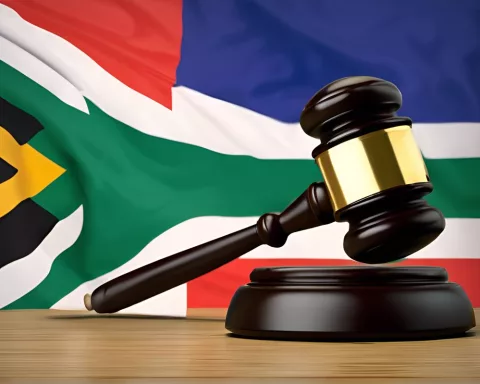This ongoing feud is a testament to the power of social media, showing how it can amplify voices, spark debates, and captivate audiences worldwide.
The Joust of Giants: What Is the Online Clash Between Elon Musk and Julius Malema?
Elon Musk, the richest person globally, and Julius Malema, the commander-in-chief of South Africa’s Economic Freedom Fighters (EFF), are engaged in an intriguing online feud. It began when Malema utilized the apartheid struggle anthem ‘Kill The Boer,’ which Musk condemned, and has since escalated into a string of fiery back-and-forths, sparking controversy and garnering worldwide attention. This ongoing feud is a testament to the power of social media, showing how it can amplify voices, spark debates, and captivate audiences worldwide.
In today’s digital age, social media has become the ultimate stage for all types of discussions, debates, and discourses. An intriguing instance of this is the verbal battle playing out between the globally acclaimed tech entrepreneur, Elon Musk, and Julius Malema, the commander-in-chief of South Africa’s Economic Freedom Fighters (EFF). What started as a lone critique has rapidly escalated into a string of fiery back-and-forths, sparking controversy and garnering worldwide attention.
The Spark of Conflict
The year 2023 marked the beginning of a compelling online feud between Julius Malema, the dynamic leader of the EFF, and Elon Musk, the richest person globally. The clash ignited when Malema utilized the apartheid struggle anthem, ‘Kill The Boer,’ which Musk strongly condemned. This event signaled the start of an exciting, though not entirely surprising, social media confrontation that left observers abuzz.
The conflict didn’t end there. Musk, known for his confrontational style, reignited the feud by once again criticizing Malema. His continuous allegations of Malema encouraging white genocide in South Africa have not only created a stir but also resulted in significant backlash.
Questioning Motives and Narratives
On an anonymous platform, referred to as ‘X’ here, some users have even begun to doubt the tech titan’s motives. These skeptics view the 52-year-old’s actions as pushing a “false narrative.” The fallout has taken an unexpected twist, with many claiming that Musk should not be identified as South African, despite being born in the country.
The following social media post captures this sentiment perfectly: “Dear South Africans. This man is not South African…just because he’s rich doesn’t mean we have to claim him.” This post echoes a broader sentiment that questions Musk’s national loyalty due to his wealth and worldwide influence.
Musk’s Unfazed Response
True to his daring nature, Musk seems undeterred by these criticisms. In response to the remarks, he showed a carefree attitude by openly declaring his affection for America. Responding swiftly to being “disowned,” Musk uploaded before-and-after photographs of himself against the backdrop of the American flag. The caption was as straightforward as his response: “America, America.”
This captivating exchange of words is a perfect illustration of the broader conflicts of ideology, identity, and influence in the Internet age. It’s a grand spectacle unfolding in the digital world, epitomizing the spirit of our times.
The Unfolding Drama
As Musk and Malema continue their verbal sparring, spectators worldwide are engrossed by this clash of formidable personalities. As the story continues to develop, it serves as a potent reminder of the power and scope of today’s digital discourse, where a single tweet can ignite a controversy, a post can provoke a discussion, and an online feud can fascinate a global audience.
This saga between Musk and Malema offers a fascinating example of how social media can amplify individual voices, allowing them to reach corners of the world that were previously inaccessible. Every tweet, post, or comment can have a far-reaching impact, making social media a powerful tool in shaping public opinion and influencing global discourse. In conclusion, this ongoing feud is a testament to the power of social media, showing how it can amplify voices, spark debates, and captivate audiences worldwide.
Who are Elon Musk and Julius Malema?
Elon Musk is a South African-born entrepreneur and billionaire, known for his work as CEO of SpaceX and Tesla. Julius Malema is a South African politician and the commander-in-chief of the Economic Freedom Fighters (EFF) party.
How did the feud between Musk and Malema begin?
The feud began when Malema used the apartheid struggle anthem ‘Kill The Boer,’ which Musk condemned. Musk’s criticism led to a string of back-and-forths between the two, sparking controversy and gaining worldwide attention.
What are Musk’s allegations against Malema?
Musk has accused Malema of encouraging white genocide in South Africa, which has resulted in significant backlash.
How have some people responded to Musk’s involvement in the feud?
Some social media users have questioned Musk’s motives, viewing his actions as pushing a false narrative. Others have disowned him as a South African due to his wealth and influence.
How has Musk responded to criticism?
Musk has shown a carefree attitude in response to criticism, openly declaring his affection for America and posting photos of himself against the backdrop of the American flag.
What does the ongoing feud between Musk and Malema illustrate about social media?
The ongoing feud between Musk and Malema illustrates the power and scope of social media in amplifying individual voices and shaping public opinion. Every tweet, post, or comment can have a far-reaching impact, making social media a potent tool in influencing global discourse.












